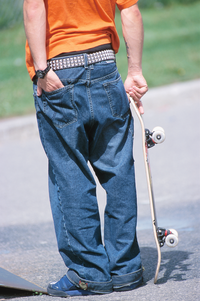Teenage Mood Swings

How many of us have been perplexed by the violent mood swings of teenagers? One minute they are out skipping through the countryside and picking wild flowers. The next they seem intent on burning down the forest…
The mood swings and anxiety often make them seem as if they have some kind of “bipolar-lite.”
An important new study has revealed that teenage mood swings may be explained by biological changes in the adolescent brain. The research is published in the journal Nature Neuroscience.
Sheryl Smith, a physiologist at the State University of New York, and her colleagues experimented on adolescent female mice and showed that their brains respond to stress in a different way from adults and pre-pubescent individuals.
Anxiety is highly complex and involves a cascade of chemical neurotransmitters and genes. One of its important regulators is the brain’s principal inhibitory neurotransmitter, gamma-aminobutyric acid (GABA). GABA counteracts the effect of glutamate, an excitatory neurotransmitter in the limbic system of the brain. There is a kind of Yin/Yang relationship between GABA and glutamate.

The brain is full of what are known as “Neurosteroids:” steroid molecules that interact with genes and receptors in nerve cells. Neurosteroids generally reduce anxiety, but this research shows that they promote anxiety in female mice around puberty via the selective desensitization of extrasynaptic GABA-A receptors.
Stress causes the release of a steroid known as 3α,5α-Tetrahydroprogesterone also known as Allopregnanolone or THP. In adult and pre-pubescent individuals THP increases the “calming” effect of GABA in the limbic system. However, Smith and her team found that THP had the opposite effect in adolescent mice. In other words the developing adolescent brain simply behaves differently
It would appear that THP has two roles, one in the limbic system where it helps to calm things down, and another in the hippocampus where in adolescents it heats things up. The hippocampus is important in memory and also in the regulation of emotion.
The underlying mechanism appears to be different levels of expression of a type of receptor known as the “alpha-4-beta-2-delta” GABA-A receptor in the hippocampal brain region known as CA1.
In adults and pre-adolescents there are few of these receptors and THP modulates and calms these regions of the brain.
However, in adolescents, the expression of these receptors is high, and the anxiety raising effect of THP in the hippocampus outweighs the calming effect it has in the limbic system.
Smith and her team were able to reverse the puberty effect in the mice by genetically altering the number of receptors.
The result of all this is that the teenage brain amplifies its reactions to stress. So whether the young person reacts by crying or being angry, the emotion will be much more pronounced than it would be in a pre-pubescent person or an adult. To adults it may seem like an overreaction, to the teenager it is his or her only response.
This study is thought to be the first to suggest an underlying physiological, as opposed to a psychological explanation for teenage mood swings.
Apart from raising understanding about what teenagers are going through, the finding raises the possibility of a new approach to more severe mood swings, such as bipolar disorder.






